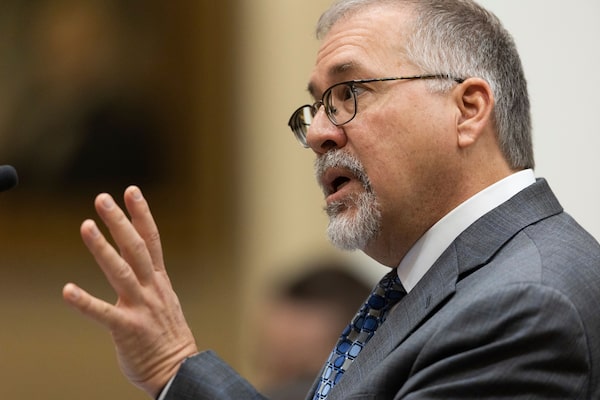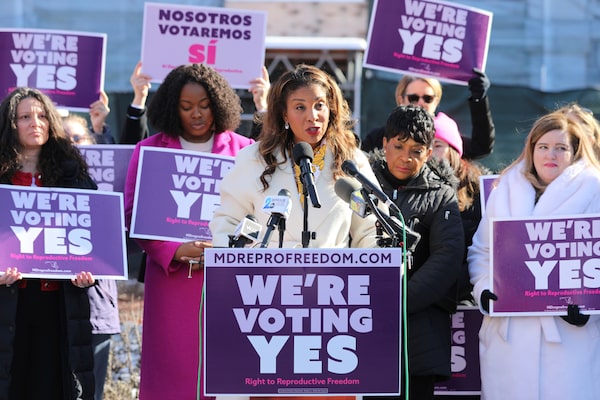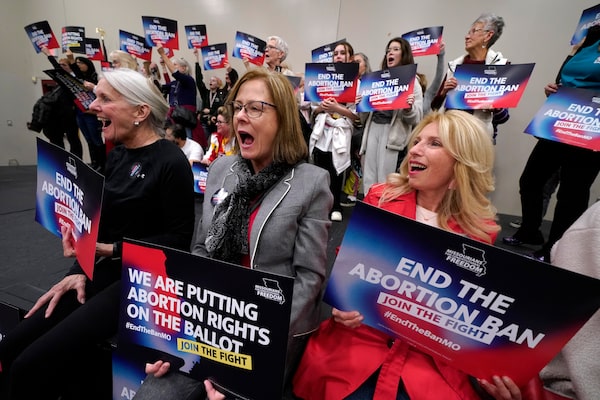
Volunteer signature gatherers watch outside a bookstore as voters prepare to sign a petition that aims to enshrine the right to abortion in Arizona, on April 10, in Phoenix.Anita Snow/The Associated Press
A push to ask Arizona voters to add a right to abortion to the state constitution took on new stakes this week when the state’s Supreme Court ruled that the state can enforce a ban on abortion in all stages of pregnancy.
Arizona is one of several states where abortion might be on the ballot this year.
Across the country, there have been increased efforts to put abortion rights questions to voters since the U.S. Supreme Court overturned Roe v. Wade and removed the nationwide right to abortion.
Since that 2022 decision, most Republican-controlled states have new abortion restrictions in effect, including 14 that ban it at every stage of pregnancy. Most Democrat-dominated states have laws or executive orders to protect access.
Additionally, voters in seven states – California, Kansas, Kentucky, Michigan, Montana, Ohio and Vermont – have sided with abortion rights supporters on ballot measures.
It’s not clear yet how many states will vote on measures to enshrine abortion access in November. In some, the question is whether amendment supporters can get enough valid signatures. In others, it’s up to the legislature. And there’s legal wrangling in the process in some states.
Some of the efforts have already failed to reach ballots. Wisconsin’s legislative session ended without a state Senate vote on a measure that the House approved to ask voters to ban abortion after 14 weeks. A Louisiana measure to enshrine abortion rights in the state constitution died in committee and one in Maine effectively died when it fell short of receiving the approval of two-thirds of the House.
WHAT’S SECURELY ON 2024 BALLOTS?
FLORIDA
The state Supreme Court ruled on April 1 that a ballot measure to legalize abortion until viability could go on the ballot despite a legal challenge from state Attorney General Ashley Moody, who argued that there are differing views on the meaning of “viability” and that some key terms in the proposed measure are not properly defined.
Advocates collected nearly a million signatures to put a state constitutional amendment to legalize abortion until viability on the ballot, surpassing the nearly 892,000 required.

Attorney General Ashley Moody's Deputy Counsel, Nathan Forrester, shares his arguments on the proposed abortion amendment to the Florida Supreme Court on Feb. 7, in Tallahassee, Fla.Alicia Devine/The Associated Press
Sixty per cent of voters would have to agree for it to take effect.
Abortion is legal in Florida through the first 15 weeks of pregnancy. But a separate April 1 state Supreme Court ruling upholding the current law triggers a 2023 law would drop that to six weeks – often before women know they’re pregnant – to take effect on May 1.
MARYLAND
Maryland voters this year will also be asked whether to enshrine the right for women to end their pregnancies in the state’s constitution in a ballot question put before them by lawmakers last year. The state already protects the right to abortion under state law and Democrats outnumber Republicans 2-1. Abortion is allowed in Maryland until viability.

Maryland first lady Dawn Moore speaks in support of a constitutional amendment to enshrine the right to abortion in the Maryland Constitution during a news conference on Jan. 22, in Annapolis, Md.Brian Witte/The Associated Press
NEW YORK
New York lawmakers agreed to ask voters to bar discrimination on the basis of pregnancy, pregnancy outcome and reproductive health care as part of a broader equal protection amendment. It would also bar discrimination on the basis of sex, sexual orientation, gender identity, national origin and disability. The language of the constitutional amendment does not mention abortion specifically. Abortion is allowed in New York law until viability.
WHERE ELSE COULD ABORTION BE ON THE BALLOT IN 2024?
ARIZONA
A signature drive is under way to add a constitutional right to abortion in Arizona. Under the measure, the state would not be able to ban abortion until the fetus is viable, with later abortions allowed to protect a woman’s physical or mental health. Supporters must gather nearly 384,000 valid signatures by July 4. An April 9 Arizona Supreme Court decision allows a ban on abortion throughout pregnancy to be enforced starting April 23.
ARKANSAS
Proponents of an amendment to allow abortion in many cases have until July 5 to gather nearly 91,000 valid signatures to get it on the Nov. 5 ballot. The measure would bar laws banning abortion in the first 20 weeks of gestation and allow abortion later in pregnancy in cases of rape, incest, threats to the woman’s health or life, or if the fetus would be unlikely to survive birth. Because it allows limits as soon as 20 weeks, the proposal does not have the support of Planned Parenthood Great Plains, which includes Arkansas. The state has a ban on abortion at all stages of pregnancy with narrow exceptions.
COLORADO
There are duelling efforts on abortion in Colorado. One measure would create a voter-initiated law to ban access throughout pregnancy and the other would amend the state constitution to protect it. The abortion rights amendment would also require Medicaid and private health insurance to cover abortion.
Supporters on each side have to submit more than 124,000 signatures to get a measure on the ballot. The deadlines to submit them are April 15 for the ban measure and April 26 for the one to ensure access. Amending the constitution in Colorado requires the support of 55% of voters. But the ban could be passed with a simple majority. Abortion is legal at all stages of pregnancy in Colorado.
MISSOURI
Pushes are under way to get multiple abortion-related ballot measures before Missouri voters in 2024. Abortion rights advocates in Missourians for Constitutional Freedom are pushing for one that would guarantee abortion is legal until viability.
A group of moderate Republicans are taking a different approach and calling for an amendment that would allow abortion up to 12 weeks, and after that only under limited exceptions.
Supporters of each measure must submit more than 171,000 valid signatures by May 5 to get them on the ballot.

Missouri residents and pro-choice advocates react to a speaker during Missourians for Constitutional Freedom kick-off petition drive, on Feb. 6, in Kansas City, Mo.Ed Zurga/The Associated Press
And some Republican lawmakers have launched a legislative process to put before voters a measure to enshrine a ban on abortion in the state constitution. It would expand provide an exception to allow for immediate abortion to save the life of the woman or in cases “for which a delay will create a serious risk of substantial and irreversible physical impairment of a major bodily function.” Further exceptions would have to be approved by voters.
Abortion is currently banned in Missouri at all stages of pregnancy with limited exceptions.
MONTANA
Abortion rights proponents in Montana have proposed a constitutional amendment that would bar the government from denying the right to abortion before viability or when it’s necessary to protect the life or health of the pregnant person. After a legal battle over the ballot language, the Montana Supreme Court on April 1 wrote its version of the language that would appear on the ballot if supporters gather more than 60,000 signatures by June 21. Abortion is legal until viability in Montana under a 1999 Montana Supreme Court opinion.
NEBRASKA
Advocates are trying to collect about 125,000 signatures needed by July 5 to put a constitutional amendment before voters to protect abortion rights until fetal viability. Under a law adopted last year, abortion is banned after 12 weeks, with some exceptions.
NEVADA
Signatures are being gathered to place an abortion access amendment on Nevada’s ballot in November. Under the amendment, abortion access for the first 24 weeks of pregnancy or later to protect the health of the pregnant person, which is already assured under a 1990 law, would be enshrined in the constitution. It requires more than 102,000 valid signatures by June 26 to place the measure on the ballot. Voters would need to approve it in both 2024 and 2026 to change the constitution.
The measure is one of several attempts by Nevada abortion rights groups to get a ballot question before voters in 2024 or 2026.
SOUTH DAKOTA
South Dakota advocates are attempting to gather more than 35,000 signatures by May 7 to get a measure on the ballot that would loosen restrictions but does not go as far as many abortion rights advocates would like. It would ban any restrictions on abortion in the first trimester of pregnancy. It would allow the state in the second trimester to “regulate the pregnant woman’s abortion decision and its effectuation only in ways that are reasonably related to the physical health of the pregnant woman.” An abortion ban would be allowed in the third trimester, as long as it included exceptions for the life and health of the woman. Planned Parenthood is not supporting the measure.
Abortion in the state is now banned at all stages of pregnancy with narrow exceptions.
WHICH STATES CAN BUT LIKELY WON’T PUT ABORTION ON THE BALLOT?
There are some states where the balance of power or other circumstances make abortion-related measures – most of them seeking bans or limits – unlikely to reach voters in 2024.
IOWA
To put a constitutional amendment on the ballot, Iowa lawmakers have to approve it in two consecutive sessions. In 2021, both chambers advanced a resolution to find there is no constitutional right to abortion in the state. Republicans control the Legislature and governor’s office, but the amendment has not emerged as a priority this year and Gov. Kim Reynolds has said she'll let the issue move through the courts rather than pushing for a vote. Abortion is currently banned 20 weeks into pregnancy. A stricter ban, which would kick in when cardiac activity can be detected, around six weeks, has been adopted but put on hold by a court.
PENNSYLVANIA
Pennsylvania has a similar process as Iowa with a similar amendment to find no constitutional right to abortion up for consideration. Lawmakers passed it in 2022. But Democrats have since taken control of the state House, making it unlikely to pass, which is required before it can go to a statewide referendum. Abortion is now legal in Pennsylvania up to 24 weeks of pregnancy.